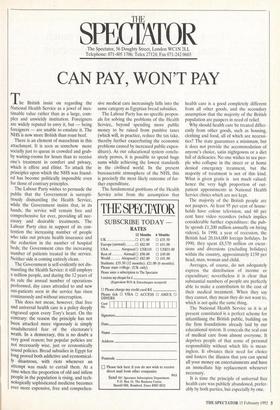SPE ml CTAT OR
The Spectator, 56 Doughty Street, London WC1N 2LL Telephone: 071-405 1706; Telex 27124; Fax 071-242 0603
CAN PAY, WON'T PAY
The British insist on regarding the National Health Service as a jewel of ines- timable value rather than as a large, com- plex and unwieldy institution. Foreigners are widely reputed to envy it, but — being foreigners — are unable to emulate it. The NHS is now more British than roast beef.
There is an element of masochism in this attachment. It is seen as somehow more socially just to queue in crowded and grub- by waiting-rooms for hours than to receive one's treatment in comfort and privacy, which is effete and elitist. To attack the principles upon which the NHS was found- ed has become politically impossible even for those of contrary principles.
The Labour Party wishes to persuade the public that the Government is surrepti- tiously dismantling the Health Service, while the Government insists that, in its hands, the service will remain free and comprehensive for ever, providing all nec- essary and desirable treatments. The Labour Party cites in support of its con- tention the increasing number of people who take out private health insurance and the reduction in the number of hospital beds; the Government cites the increasing number of patients treated in the service. Neither side is coming entirely clean.
The Government is self-evidently not dis- mantling the Health Service: it still employs a million people, and during the 12 years of its rule the annual number of operations performed, day cases attended to and new out-patients seen in the service has risen continuously and without interruption.
This does not mean, however, that free and universal health care is a policy deeply engraved upon every Tory's heart. On the contrary: the reason the principle has not been attacked more vigorously is simply unadulterated fear of the electorate's wrath. In a democracy, this is no doubt a very good reason; but popular policies are not necessarily wise, just or economically sound policies. Bread subsidies in Egypt for long proved both addictive and economical- ly disastrous, with riots whenever an
attempt was made to curtail them. At a time when the proportion of old and infirm
people in the population is rising, and tech- nologically sophisticated medicine becomes ever more expensive, free and comprehen-
sive medical care increasingly falls into the same category as Egyptian bread subsidies.
The Labour Party has no specific propos- als for solving the problems of the Health Service, beyond spending more public money to be raised from punitive taxes (which will, in practice, reduce the tax take, thereby further exacerbating the economic problems caused by increased public expen- diture). As our educational system conclu- sively proves, it is possible to spend huge sums while achieving the lowest standards in the civilised world. In the present bureaucratic atmosphere of the NHS, this is precisely the most likely outcome of fur- ther expenditure.
The fundamental problems of the Health Service .arise from the assumption that health care is a good completely different from all other goods, and the secondary assumption that the majority of the British population are paupers in need of relief.
Why should health care be treated differ- ently from other goods, such as housing, clothing and food, all of which are necessi- ties? The state guarantees a minimum, but it does not provide the accommodation of anyone's choice, satin nightgowns or a diet full of delicacies. No one wishes to see peo- ple who collapse in the street or at home denied emergency treatment, but the majority of treatment is not of this kind. What is given gratis is not much valued: hence the very high proportion of out- patient appointments in National Health Service clinics which are not kept.
The majority of the British people arc not paupers. At least 95 per cent of house- holds have colour television, and 60 per cent have video recorders (which implies considerable further expenditure: the pub- lic spends £1,200 million annually on hiring videos). In 1990, a year of recession, the British had 20,164,000 foreign holidays. In 1990, they spent £8,570 million on excur- sions and diversions (excluding holidays) within the country, approximately £150 per head, man, woman and child.
Averages, of course, do not adequately express the distribution of income or expenditure; nevertheless it is clear that substantial numbers of people are perfectly able to make a contribution to the cost of their medical treatment. When they say they cannot, they mean they do not want to, which is not quite the same thing.
The National Health Service as it is at present constituted is a perfect scheme for infantilising the British public, building on the firm foundations already laid by our educational system. It conceals the real cost
of medical care from almost everyone. It deprives people of that sense of personal responsibility without which life is mean- ingless. It obviates their need for choice and fosters the illusion that you can spend all your money on entertainments and have an imniediate hip replacement whenever necessary:
It is time the principle of universal free health care was publicly abandoned, prefer- ably by both parties, but especially by one.


























































 Previous page
Previous page